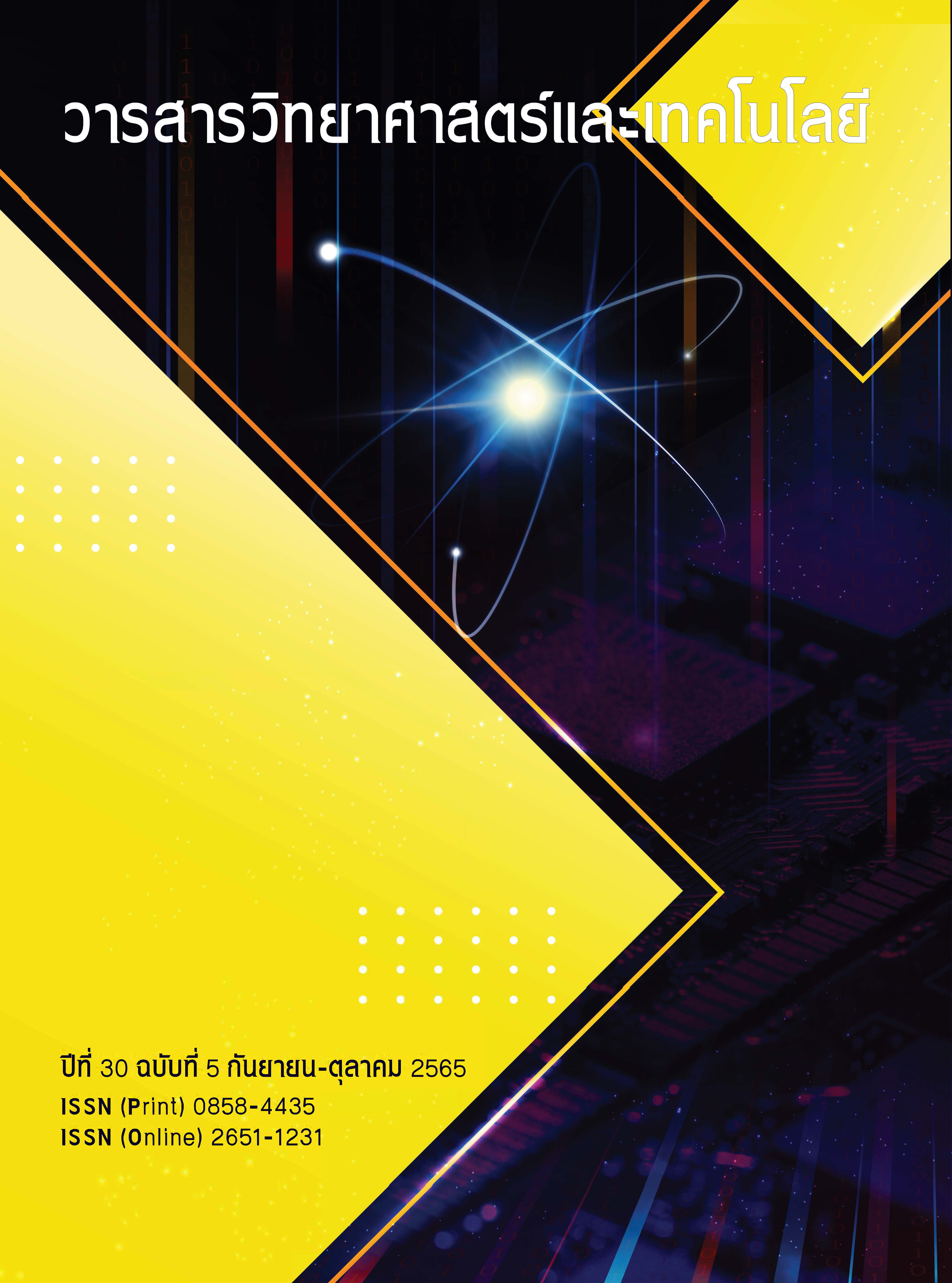ประสิทธิภาพของเครื่องฟอกอากาศชนิดนาโนคอนไฟน์คะตะไลติกออกซิเดชั่นในการลดปริมาณฝุ๋นละอองและจุลินทรีย์ในอากาศ
Main Article Content
บทคัดย่อ
การวิจัยนี้มีเป้าหมายในการศึกษาประสิทธิภาพของเครื่องฟอกอากาศชนิดนาโนคอนไฟน์คะตะไลติกออกซิเดชั่น ซึ่งเป็นเทคโนโลยีใหม่ในเครื่องฟอกอากาศ การตรวจวัดปริมาณฝุ่นละอองและเชื้อจุลินทรีย์ในอากาศทำโดยตรวจวัดก่อนการเปิดเครื่องฟอกอากาศ และหลังเปิดเครื่องฟอกอากาศที่เวลา 1 ชั่วโมง 6 ชั่วโมง และ 14 วัน เพื่อศึกษาประสิทธิภาพของเครื่องฟอกอากาศในกรณีการเปิดใช้งานในระยะเวลาสั้นและระยะเวลายาวต่อเนื่อง ซึ่งจากผลจากการตรวจวัดปริมาณฝุ่นละอองและเชื้อจุลินทรีย์ในอากาศหลังจากเปิดเครื่องฟอกอากาศ พบว่ามีประสิทธิภาพในการลดปริมาณฝุ่นละอองและเชื้อจุลินทรีย์ในอากาศได้ตั้งแต่ชั่วโมงแรกของการเปิดใช้งาน และเมื่อเปรียบเทียบกับมาตรฐานดัชนีคุณภาพอากาศในประเทศไทย พบว่าสามารถลดปริมาณฝุ่นละอองจากระดับไม่ปลอดภัยเป็นระดับดีมากได้ภายหลังจากเปิดเครื่องฟอกอากาศเป็นเวลา 6 ชั่วโมง และเมื่อเปรียบเทียบปริมาณเชื้อจุลินทรีย์ในอากาศกับมาตรฐานค่าดัชนีการปนเปื้อนของเชื้อจุลินทรีย์ในอากาศ พบว่าสามารถลดปริมาณเชื้อแบคทีเรียและเชื้อราในอากาศจากระดับ แย่ หรือแย่มาก เป็นระดับปานกลางได้ในชั่วโมงที่ 6 ภายหลังเปิดเครื่องฟอกอากาศเช่นเดียวกัน ส่วนกรณีเปิดเครื่องฟอกอากาศในระยะยาวและต่อเนื่อง เป็นเวลา 14 วัน โดยไม่เปิดระบบปรับอากาศพบว่าสามารถลดปริมาณฝุ่นละอองและปริมาณเชื้อราได้ดี
Article Details
เอกสารอ้างอิง
Tran V-V, Park D. and Lee Y-C., 2020. Indoor Air Pollution, Related Human Diseases, and Recent Trends in the Control and Improvement of Indoor Air Quality. Int J Environ Res Public Health. 17(8): 2927
Limmongkon Y, Sribenjalux P. and Chuaybamroong P., 2009. Capability of Electronic-filter Air Purifier on Airborne Microorganism Removal. J Med Tech Phy Ther. 21: 246-256. (in Thai)
Limmongkon Y, Thunyasirinon C, Chotigawin R, Sribenjalux P, and Chuaybamroong P., 2012. Airborne Microorganism Removals Using Air Purifiers with Different Principles. KKU Res. J. 17(2): 236-244. (in Thai)
Hacker DW and Sparrow EM., 2005. Use of Air-cleaning Devices to Create Airborne Particle-free Spaces Intended to Alleviate
Rhinitis and Asthma during sleep. Indoor Air. 15(6): 420-431.
H.J. Oh, I.S. Nam, H. Yun, J. Kim, J. Yang and J.R. Sohn, 2014. Characterization of Indoor Air Quality and Efficiency of Air Purifier in Childcare Centers, Korea. Building and Environment, 82: 203-214.
Kwok A, Hong C, and Kwok E., 2021. Evaluation of Nano-confined Catalytic Oxidation Air Purification Technology on Eliminating Marijuana Chemicals and Odour. SN Appl. Sci. 3(10): 808
Leung A and Kwok E, 2012. Evaluation of the Nano-confined Catalytic Oxidation Technology for Air Purification and Odor Reduction. Adv Mater Res. 550: 607–615
Kwong C.W., Chao C.Y.H., Hui K.S. and Wan M.P., 2008. Catalytic Ozonation of Toluene Using Zeolite and MCM-41 Materials. Environ Sci Technol. 42(22):8504–8509
Singapore, 2016. Singapore Standard SS 554: 2016 Code of Practice for Indoor Air Quality for Air-Conditioned Buildings.
[online] Available source: http://www.enviresearch.co.th/wpcontent/uploads/2020/01/Indoor-Air-2016.pdf, Jun, 7, 2022 (in Thai)
Singapore, 2009. Singapore Standard SS 554: 2009 Code of Practice for Indoor Air Quality for Air-Conditioned Buildings.
[online] Available source: http://www.enviresearch.co.th/wpcontent/uploads/2020/01/Indoor-Air-2009.pdf, Jun,7, 2022. (in Thai)
Air Quality and Noise Management Bureau, Pollution Control Department., 2021. Thailand’s Air Quality nformation. [online] Available source: http://air4thai.pcd.go.th/webV2/aqi_info.php, Sep, 7, 2021. (in Thai)
Pasquarella C, Pitzurra O and Savino A, 2000. The Index of Microbial Air Contamination. J Hosp Infect. 46(4): 241-256.
Sripaung N and Anantagulnathi P, 2021. Manual for Surveillance, Prevention, and Control of Diseases and Health Threats Caused by PM2.5. Nonthaburi: Division of Occupational and Environmental Diseases, Department of Disease Control, Ministry of Public Health; pp.31-35. (in Thai)


